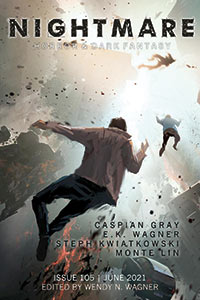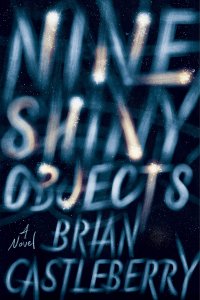Charles Payseur Reviews Short Fiction: Escape Pod, Cast of Wonders, Worlds of Possibility and Samovar
 Escape Pod 6/22/23
Escape Pod 6/22/23
Cast of Wonders 6/24/23
Worlds of Possibility 6/23
Samovar 6/26/23
This June saw a new original from Escape Pod with Andrew Dana Hudson’s “The Uncool Hunters”, which follows Rocky, an uncool hunter (or a fucking uncool hunter to properly capture the seriousness of the profession) – who wades through the actual habits of the median consumer, helping corporations to understand and profit from the large-demographic data. It’s big money at stake, and sometimes it’s dangerous work, as when Rocky’s scoping a Costco and witnesses her nemesis and rival doing something disreputable even for them. The piece is a comic romp, fun and a bit zany but grounded in the realities and greed of corporate culture. Rocky is a mercenary and not afraid to get her hands dirty, even if it means turning a big box store into a battleground, and Hudson captures it all with a sharp critique of the increasing corruption and invasive practices of media and marketing.
Cast of Wonders celebrated June with Seoung Kim’s “Park’s All-Night Ramyun and Snack Emporium”, which continued the humorous trend but added some emotional vulnerability in a coming-of-age story about Yujin working in their appa’s food truck. Trying their best to be unnoticed and failing, they are asked to escort a customer home in a world where the supernatural is not separated from the mundane, and where a number of magic-touched individuals love the care and flavors Yujin’s appa dishes out. Kim illuminates the conflict inside Yujin, the simultaneous desire to be invisible and seen, and weaves memory, family, empathy, and food into a warm and lovely narrative that I could really sink into. It’s perfect for younger readers and adults alike.
Fresh off a successful crowdfunding campaign, Worlds of Possibility’s June issue is full of fantastic content, including Eliza Chan’s “The Ng Yut Queen (The 五 月 Queen)”, in which Ada is visited by the goddess Guanyin, who she had prayed to as a child and who, years later, is finally catching up on making those prayers come true. For the shy Chinese kid desperate to fit in with the British life her mother brought her to, that meant being more like her white, blonde, and popular friend who was May Queen of the Fair. For the adult who has moved to London and still feels isolated and out of place, being confronted by those prayers, having them come true (including literally honeyed hair), makes her confront the things she’s running from, the fears she carries with her. Chan’s dialogue is wonderful, the characters popping with personality and angst. The story is part comedy of errors, part slowly realized romance, and everything balances in a satisfying and vibrant way. In the issue’s poetry, Zaynab Iliyasu Bobi combines math with the realities of race and Blackness in “Rewriting the Formula of Race as a Single Sentence”. The piece challenges the supposedly neutral nature of mathematics, showing how it is often used to reinforce inequality and white privilege, and Bobi posits a different proof, a different equation that will allow Black people to live and breathe. There is a power to the act, both of creating the poem and the math the poem traces, to prove a humanity that cannot reduce suffering into numbers and cannot hide behind the false neutrality of intellectualism. It’s a stirring and bracing read. As is Winifred Yost’s aching and beautiful poem “She Says”, which also engages with freedom and cages. Whereas Bobi focused on math, though, Yost lingers on the stories people tell about themselves – the fantasies they insist are just that and not truths struggling to find their way into the light. Through roleplay, personas, acting, and games the narrator of the poem experiences a release from the omnipresence of their assigned gender, cracking the shell inthe illusion that people are defined by how they are born. The stories, the fantasies, are revealed to messages the narrator has been sending to herself, and can now recognize for what they are. It’s a poignant and joyous poem.
June also ushered in a new issue of the translation-focused Samovar, where Elena Pavlova’s “A Pilgrimage to Memories Tattooed” (translated by the author and Desislava Sivilova) invites readers to a future where the narrator of the piece is researching the practice of tattooing people – not just with ink, but with memories themselves. It’s a practice that has its roots in the very controversial act of requiring some criminals to be tattooed, not exactly to punish them but in the hope that through these memories they can experience empathy with others that would deter their criminality. And from there, political movements rose and fell, and society itself cracked and fractured, the art of tattooing remained, and the ways that empathy spread are explored in all their messy contours by the narrator and author. It’s a complex work about discovering lost history, and reaching for a better world, and Pavlova does a masterful job in wrapping all into a compelling story.
Recommended Stories
“Park’s All-Night Ramyun and Snack Emporium”, Seoung Kim (Cast of Wonders 6/23)
“The Ng Yut Queen (The 五 月 Queen)”, Eliza Chan (Worlds of Possibility 6/23)
Charles Payseur is an avid reader, writer, and reviewer of speculative fiction. His works have appeared in The Best American Science Fiction and Fantasy, Lightspeed Magazine, and Beneath Ceaseless Skies, among others, and many are included in his debut collection, The Burning Day and Other Strange Stories (Lethe Press 2021). He is the series editor of We’re Here: The Best Queer Speculative Fiction (Neon Hemlock Press) and a multiple-time Hugo and Ignyte Award finalist for his work at Quick Sip Reviews. When not drunkenly discussing Goosebumps, X-Men comic books, and his cats on his Patreon (/quicksipreviews) and Twitter (@ClowderofTwo), he can probably found raising a beer with his husband, Matt, in their home in Eau Claire, Wisconsin.
This review and more like it in the September 2023 issue of Locus.
 While you are here, please take a moment to support Locus with a one-time or recurring donation. We rely on reader donations to keep the magazine and site going, and would like to keep the site paywall free, but WE NEED YOUR FINANCIAL SUPPORT to continue quality coverage of the science fiction and fantasy field.
While you are here, please take a moment to support Locus with a one-time or recurring donation. We rely on reader donations to keep the magazine and site going, and would like to keep the site paywall free, but WE NEED YOUR FINANCIAL SUPPORT to continue quality coverage of the science fiction and fantasy field.
©Locus Magazine. Copyrighted material may not be republished without permission of LSFF.






